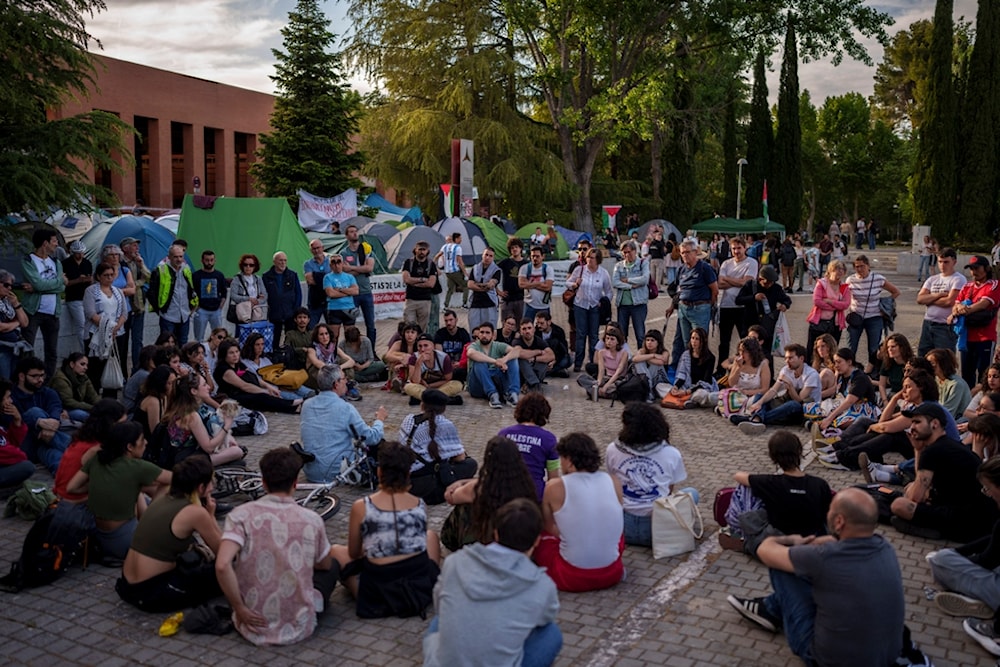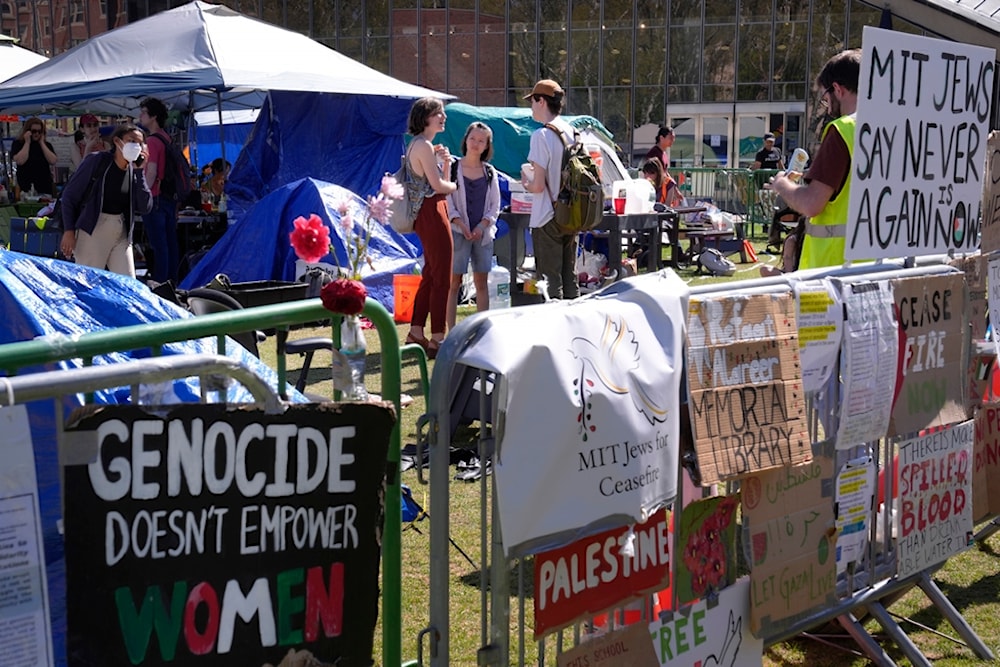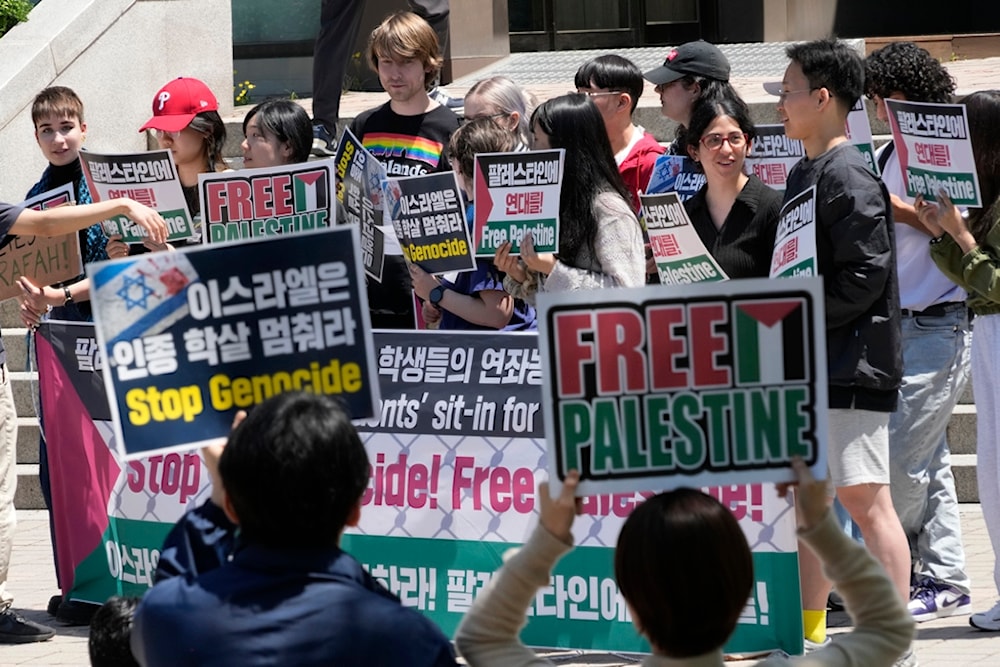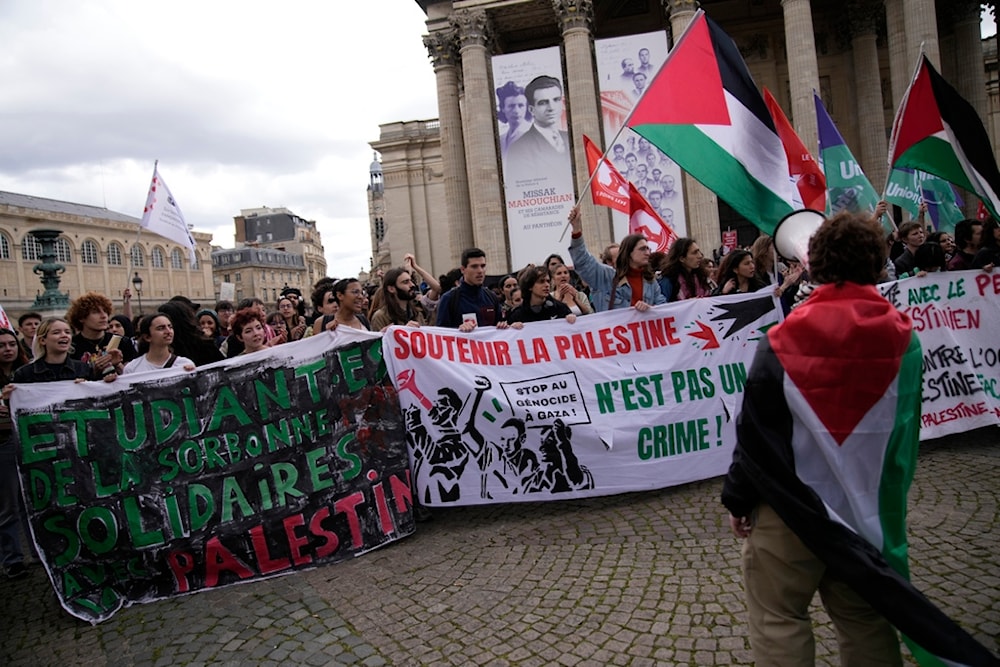Global uprisings for Gaza: The moral triumph of student revolts
The student movement in the US is a moral victory for the working class that must be translated into a political victory.
-

Global uprisings for Gaza: The moral triumph of student revolts (Illustrated by Mahdi Rteil to Al Mayadeen English)
Pro-Palestine student demonstrations have been gaining traction in recent weeks. Footage of protesters being beaten up and tear-gassed has circulated across all social media platforms. These harrowing images indicate a new low in the state of Western democracy, where state policies supportive of Israeli apartheid benefit only a few, particularly the financial class that profits from war spending and extends colonial policies. It is fair to say now that nothing about the US can truly be deemed democratic, let alone its academic institutions. These are, after all, institutional agencies of the ruling class. They are a product of the consensus generated by capitalists and their allied classes, who maintain themselves through institutional forms that serve their profit-making ends.
In times of crisis such as these, these institutions reveal themselves for what they are: instruments of the ruling class that suppress even peaceful action objecting to atrocities committed by the Israeli regime. Repression is standard practice in a country where the illusion of choice prevails. In fact, such American democracy is nothing more than a form of power deployed to crush dissent. One need only think of the repression of African Americans and their continued relegation to below subsistence levels.
One must also remember that American institutions have international reach, and the suppression of dissent at home—such as through mass incarceration of the poor—takes the form of massive war visited upon the developing world and/or austerity policies guaranteed to create conditions of structural genocide, dismal living conditions, and subsequent unnecessary loss of life due to hunger and disease. Not even nature has been spared. Today, the planet heads towards a dead end, all due to a reigning ideology that prioritizes profits over people.
Challenges ahead
Though students have proven to be brave in defying school administrators and law enforcement, the means by which they attempt to reach the goal of divestment has not proven effective thus far. But the issue of student revolt is much more than achieving success in divesting from "Israel". The issue lies in the moral connection humans feel with one another and the spinoff of that into novel forms of consciousness and organization that will apply brakes to a system that expands through the destruction of both humanity and nature. Most revolts are imbued with a spontaneous element driven by moral incentives, but the challenge remains in capturing the moment and allowing it to sustain itself into the future through counter-systemic institutions that will relieve the US and the Third World from the reign of ruling classes, which embody the morals of inanimate things rather than humans. This will push for a new morality centered on a shared future and a sane environment for humanity.
-

Students gather during a protest against the war on Gaza at the Complutense University in Madrid, Spain, Thursday, May 9, 2024 (AP Photo/Manu Fernandez)
The task is not easy at present because the US ruling classes have co-opted and perverted revolutionary thought through many liberal and pseudo-Marxist financed circles that still frame the problem as national rather than international. The plight of humanity today is cross-national and requires a cross-national effort to rein in. Students who have set up encampments for Gaza all across the world are always wary of the risks involved. They are afraid to disclose their identities. This is why they are often seen with their faces covered and use nicknames when addressing the media.
The rise of technology has not only destroyed nature and produced commodities that only serve the rich North and their affiliates in the South, but it has also been a weapon against the working classes and their freedom of expression. Technology did not fix problems in the past and will not do so in the future unless its subjects, the masses, seize hold of it and steer it towards social well-being.
-

Massachusetts Institute of Technology students and supporters gather in an encampment of tents, Tuesday, May 7, 2024, on the MIT campus, in Cambridge, Mass (AP Photo/Steven Senne)
Doomed to failure?
Some say that peaceful protests in the West are doomed to failure. Such a hypothetical statement is unfounded; the protests are already successful because they have brought the Palestinian question to the attention of the world. They also demonstrate that humans cannot be deprived of their shared humanity and morality, something that capital seeks to undermine. Turning people into commodities and things expands the scope of commerce and industrial activity, thereby increasing the circulation of money and, consequently, profits. What is most striking is the fact that students have overcome a number of challenges whose nature would never have been thought to be surmountable. By challenging the notion that ideology is indestructible, students have effectively shown that consciousness can be elevated in spite of all these hurdles.
Normally, experts and historians would see otherwise and for obvious reasons. Of the chief reasons why is the fact that American capital is historically tied to Israeli capital. Capital is fundamentally a social relation of classes, where the rich benefit at the expense of the working poor. "Israel's" colonial settler project and its detrimental effects in Asia and Africa support reactionary regimes that exploit the resources of poor countries for the benefit of the West. As part of imperialist aims to expand American capital in the Middle East, "Israel" plays a strategic role in fulfilling these purposes. The 75-year-long occupation of Palestine and the historical wars against Arab states have served to disarm Palestinians and Arab populations both materially and ideologically. Once resistance movements are thwarted, it becomes easier for Empire to control and exploit regional resources. The display of power or war forces the masses to surrender their assets and labor for paltry prices.
-

Students gather after a tent is set up at Seoul National University in Seoul, South Korea, Wednesday, May 8, 2024 (AP Photo/Ahn Young-joon)
Because of this relationship, the portion of the American electorate identifying as pro-Palestinian may not be sufficient to pressure divestment from "Israel". Many in the West benefit from "Israel", and even Biden has called "Israel" a worthwhile investment. However, there are now existential reasons why an all-out revolt across the world is possible. Revolts usually begin small. The destruction of the environment knows no bounds, and capital is behind it. True, the fallout of profits accumulated from the US war machine is largely responsible for the Western standard of living, but in fifty years' time, sickened nature will make living difficult for everyone. Such is the ontological condition, or the way things are.
Secondly, the nature of the US political system is authoritarian. Typically, all class systems are. Contrary to the statement made earlier this month by US President Joe Biden, the United States is indeed authoritarian, albeit not in the stereotypical sense. Its authoritarianism extends across the globe in the form of military bases, NGOs, and apparatuses disseminating ideas to people, involving themselves in proxy wars and acts of mass suicide. This US authoritarianism is manifested in a political landscape dominated by solely two major parties, both of which share similar objectives of expanding capital through arms sales and creating conditions conducive to ideological defeatism. Nonetheless, the American ruling system regards any form of national or individual autonomy over resources or thought as a threat. Not only Russia or migrants at the border, but both parties share a common goal of maintaining hegemony and control over the mind first, and subsequently, resources. This brings me to my third and last point: mainstream academia.
-

Students gather at the Pantheon monument Friday, May 3, 2024 in Paris. Students waved Palestinian flags and chanted slogans in support of Palestine (AP Photo/Christophe Ena)
Mainstream academia has a long history of disparaging revolutionary ideas. This is evident not only in the ample number of professors claiming to be Marxist but who advocate for welfare in the North at the expense of imperialist wars against the South. Or the idea that Northern machines produce wealth when, in fact, the South is exploited so often that machines and technology could only develop in the North. Machines and their output are products of social relations, principally the deprivation of the South from the right to development. In a world that overproduces and in which capital competes for low-cost inputs, the South is destined to wallow in poverty. Such basic ideas are missing in mainstream discourse. Worse yet, these 'professors' do their best to produce ideas of conformity, which align the masses with capital. The principal point of Western academia is that the system is here to stay. There is no alternative, which is a logically ridiculous point. Voting patterns in the West further support this trend, as working-class Americans have consistently backed governments engaged in imperialist warfare. These wars are often justified under the banner of democracy, championed by proponents of Western-bred Cultural Marxism. If one were to ask what the biggest weapon of capital is, one will inevitably arrive at the point that Western academic institutions have produced a pattern of thought that has already driven the planet to the brink.
It is crucial to recall that the US ruling class is imperialist. It earns rents from war and neoliberal policies applied across the globe. The point then becomes: are the masses ignorant enough to believe in the doctrines of capital? Not so is the answer. Just as students are beaten on campus to refrain from demonstrating, the Third World is beaten by wars or the threat of war to adhere to the dominant ideology. The idea that there is no escape from a system that uses cheap labor and nature to expand, and does so by dehumanizing people into things, is prevalent. Much of the Western-left theory on the Middle East and similar issues stems from a pro-imperialist stance that supports expansionist agendas. This is a continuation of European social democracy: bomb abroad and bring the war booty home. This connection between theory and practice is regressive and is principally driven by the academic class, which embodies capital. By misidentifying the class enemy, by saying that Qaddafi is the enemy rather than the Western ruling classes, they promote an agenda of war. Not to forget, war is the principal activity of capitalism that resolves its piling contradictions and crises.
Lessons from Columbia
Recently, students at Columbia University endured much hardship when the police were dispatched to arrest all those who occupied Hamilton Hall, also known as "Hind Hall" by students. The night of May 3rd at Columbia University witnessed one of the most barbaric police crackdowns in US history, with officers forcefully removing barricades and arresting students en masse. The person who called the police, Dr. Shafik, is an Arab comprador with a long history of contributing to neoliberal policies in the Arab world while working for international financial institutions. Her papers advocating for free markets and the removal of subsidies have driven many in the Arab world into hunger. Hunger cuts life short, and it is a murder in slow motion. Class is not defined by nationality; it is defined by the way people make their living. Some toil, and few snatch the product from the toiling classes. In an integrated production system, the laborers are from all nations, and so are the rentiers.
The student movement in the US is a moral victory for the working class that must be translated into a political victory. The time is now.

 10 Min Read
10 Min Read








